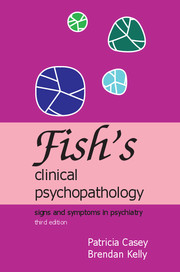Book contents
- Frontmatter
- Contents
- The authors
- Preface
- 1 Classification of psychiatric disorders
- 2 Disorders of perception
- 3 Disorders of thought and speech
- 4 Disorders of memory
- 5 Disorders of emotion
- 6 Disorders of the experience of self
- 7 Disorders of consciousness
- 8 Motor disorders
- 9 Personality disorders
- Appendix I Psychiatric syndromes
- Appendix II Defences and distortions
- Index
4 - Disorders of memory
Published online by Cambridge University Press: 15 February 2018
- Frontmatter
- Contents
- The authors
- Preface
- 1 Classification of psychiatric disorders
- 2 Disorders of perception
- 3 Disorders of thought and speech
- 4 Disorders of memory
- 5 Disorders of emotion
- 6 Disorders of the experience of self
- 7 Disorders of consciousness
- 8 Motor disorders
- 9 Personality disorders
- Appendix I Psychiatric syndromes
- Appendix II Defences and distortions
- Index
Summary
Memory is of three types: sensory, short-term and long-term. It can be compared to a sieve with holes of varying size to assist in identifying material that is relevant from that which is irrelevant. The first, known as sensory memory, is registered for each of the senses and its purpose is to facilitate the rapid processing of incoming stimuli so that comparisons can be made with material already stored in short- and long-term memory. Since there are numerous stimuli bombarding the individual, selective attention allows for the sifting of relevant material from sensory memory for further processing and storage in short-term memory. As a consequence, most sensory memory fades within a few seconds. Short-term memory, also called working memory, allows for the storage of memories for much longer than the few seconds available to sensory memory. Short-term memory aids the constant updating of one's surroundings. For example, if you saw a person walking a dog and a few seconds later heard a dog bark you would not be surprised since you would identify the likely source of the sound from sensory (visual) memory that had been processed and encoded in shortterm (working) memory.
When memories have been rehearsed in short-term memory they are encoded into long-term memory. Encoding is the process of placing information into what is believed to be a limitless memory reservoir, which can occur for specific stimuli as well as for the general memory. For example, passing a large two-storey house painted yellow with a tennis court and two sports cars in front might be recalled exactly (visual encoding) or recalled in more general terms as the large home of a wealthy owner (semantic encoding).
The storage of material in long-term memory allows for recall of events from the past and for the utilisation of information learned through the education system. It is resilient to attack, unlike short-term memory, which is sensitive to disorders of brain tissue such as Alzheimer's disease.
Autobiographical memory refers to the memories for events and issues that relate to oneself. These may be for specific facts, for example whether you are you married, and specific experiences, for example your wedding day.
- Type
- Chapter
- Information
- Fish's Clinical PsychopathologySigns and Symptoms in Psychiatry, pp. 55 - 64Publisher: Royal College of PsychiatristsPrint publication year: 2007



